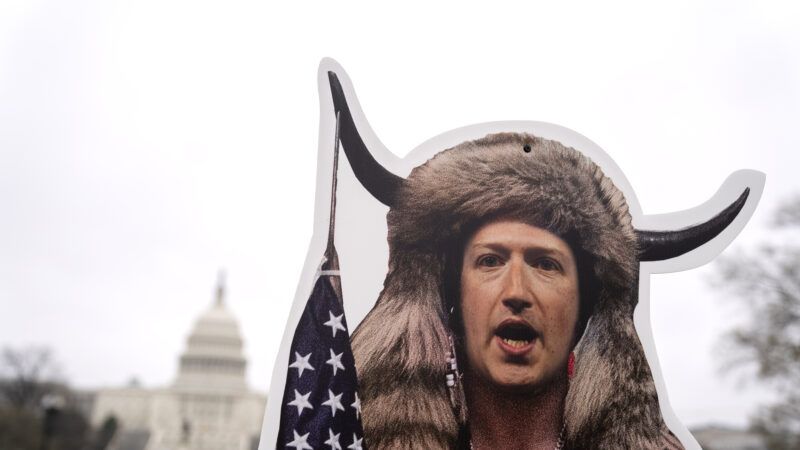Both the Left and the Right Are Exaggerating the Threat Posed by Facebook
Facebook can't kill, jail, or tax you. It can only stop you from posting on Facebook.

Charged with determining whether Facebook erred in suspending former President Trump following the January 6 Capitol riots, the Facebook Oversight Board—which exists solely for the purpose of taking difficult content moderation decisions out of Mark Zuckerberg's hands—essentially shrugged and returned the decision to Facebook. The board did rule, however, that the indefinite suspension was inconsistent with the the company's policies, and Facebook should revisit the matter in the next six months.
A conceivable outcome of this ruling is that Facebook will eventually decide, sometime later this year, that it has little choice but to un-ban Trump. Indeed, the board criticized Facebook for "applying a vague, standardless penalty." One might have expected tech-skeptical conservatives to be somewhat pleased with this ruling, since it was ultimately a rebuke of Facebook, and one that hints at the potential return of Trump.
Instead, the right had a meltdown.
"Twitter and Facebook are Fascist companies," tweeted (yes, tweeted) Candace Owens. "We should all begin slowly migrating away from their platforms."
Rachel Bovard of the Conservative Partnership Institute opined that the actual issue was Facebook's "hegemonic control over global political speech, reinforced today by the platform anointing itself with the moral authority to memory hole future world leaders at their own discretion."
Facebook has neither hegemonic control over political speech nor memory-hole powers—indeed, the former president recently engaged in political speech with Owens, possibly offering her the veep slot if he runs again—and yet many conservatives argue that the Facebook Oversight Board's decision was not merely wrong but evidence that Facebook's powers supersede the U.S. government's.
"A multi-national corporation just assumed a supranational level of sovereignty and is LARPing as a government," fretted Will Upton, a conservative public relations specialist formerly with the U.S. Treasury.
J.D. Vance, a likely Republican candidate for Ohio's U.S. Senate seat in 2022, upped the hysteria even further: "The Facebook oversight board has more power than the United Nations," he said.
Facebook is indeed a powerful and influential company, but these people all need a reality check. The social media site does not wield nearly as much power as actual governments. Facebook doesn't drop bombs on its enemies or send troops to bust down their doors and kill them. Facebook can't put people in jail, or confiscate their money, or forbid them from gathering in groups, or force children as young as three to wear masks while they play sports outside. The only thing Facebook can do is stop people from posting on Facebook.
The right's escalation of Facebook moderation policies to an extinction-level threat is extremely unhelpful, as it obscures some legitimate concerns about how the media bullies the company into making bad calls, as well as issues with the various hypocrisies—often unintentional—produced by uneven enforcement. But to hear conservatives tell it, we are supposed to believe that Facebook's existence has singlehandedly ended the American experiment in representative democracy.
"Allowing near-trillion dollar companies like Facebook to act as political partisans, censoring one side while amplifying the other, is tantamount to election interference and represents an existential threat to our democracy," asserted Jon Schweppe of the American Principles Project in a characteristic post on this subject. "It simply cannot be allowed to go on. We all know what happened in 2020. By censoring advertisements, banning conservative influencers, and falsely fact-checking verifiably true content, Facebook and other social media companies swung the election to Joe Biden."
What's especially telling about this sort of panic is that it perfectly mirrors liberals' own ongoing freakout about Facebook. Indeed, with only minor changes to Schweppe's statement, it would be identical to something Rachel Maddow or Sen. Elizabeth Warren (D–Mass.) might say: We all know what happened in 2016. By allowing Russian-backed influence operations to spread viral disinformation, Facebook and other social media companies swung the election to Donald Trump.
Forget the millions of dollars the campaigns spent on their own advertising on television, the radio, in print, and elsewhere: A handful of misleading Facebook posts and/or bad moderation calls were the decisive factors. Clearly.
While liberals and conservatives can't agree on which side is supposedly receiving an unfair advantage from social media, they increasingly agree on the solution: break up Big Tech. Progressives like this approach because punishing big corporations for sheer bigness is a time-honored liberal tradition, and conservatives like this approach because it will make Mark Zuckerberg rue the day he crossed them. Why anyone should expect Facebook's smaller successor companies to have superior moderation policies is never explained.
